

FBI launches $1 billion face recognition project - tech - 07 September 2012. The Next Generation Identification programme will include a nationwide database of criminal faces and other biometrics "FACE recognition is 'now'," declared Alessandro Acquisti of Carnegie Mellon University in Pittsburgh in a testimony before the US Senate in July.
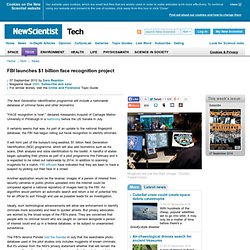
It certainly seems that way. As part of an update to the national fingerprint database, the FBI has begun rolling out facial recognition to identify criminals. It will form part of the bureau's long-awaited, $1 billion Next Generation Identification (NGI) programme, which will also add biometrics such as iris scans, DNA analysis and voice identification to the toolkit. A handful of states began uploading their photos as part of a pilot programme this February and it is expected to be rolled out nationwide by 2014.
Another application would be the reverse: images of a person of interest from security cameras or public photos uploaded onto the internet could be compared against a national repository of images held by the FBI. New "Smart Meters" for Energy Use Put Privacy at Risk. The ebb and flow of gas and electricity into your home contains surprisingly detailed information about your daily life.
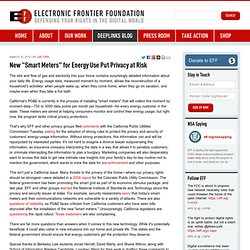
Energy usage data, measured moment by moment, allows the reconstruction of a household's activities: when people wake up, when they come home, when they go on vacation, and maybe even when they take a hot bath. California's PG&E is currently in the process of installing "smart meters" that will collect this moment by moment data—750 to 3000 data points per month per household—for every energy customer in the state.
These meters are aimed at helping consumers monitor and control their energy usage, but right now, the program lacks critical privacy protections. That's why EFF and other privacy groups filed comments with the California Public Utilities Commission Tuesday, asking for the adoption of strong rules to protect the privacy and security of customers' energy-usage information. This isn't just a California issue. Who's Watching? Privacy Concerns Persist as Smart Meters Roll Out - Iceweasel. Energy consultant Craig Miller, who spends much of his time working to make the smart grid a reality, got a jolt when he mentioned his work to a new acquaintance. The man, who happened to be a lineman at a Pennsylvania utility, responded earnestly: "Smart meters are a plot by Obama to spy on us.
" The encounter was a disheartening sign of the challenge ahead for proponents of the smart grid, who say that the technology can help the industry meet power demand, fix problems faster, and help consumers lower their electricity bills. Advocates of such a 21st-century grid are learning that they need to take privacy concerns seriously. Though smart meters are not, in fact, a domestic espionage scheme, they do raise questions: In a world where households start talking with the power grid, what exactly will be revealed? And who will be listening? Capitalizing on the Internet of Things - YouTube - Iceweasel.
InternetofThingsFactsheetPrivacyandSecurity. The Internet of Things Has Arrived — And So Have Massive Security Issues. Photo: Jim Merithew/Wired Internet.
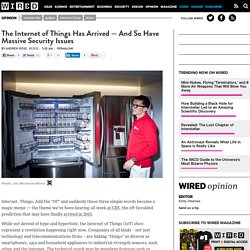
Things. Why 2013 will be the year of the Internet of Things - The Next Web - Iceweasel. This year’s Le Web event in Paris was based around the them of the Internet of Things (IoT); the way in which objects around us will gather data and connect to controls or other machines via the Internet.
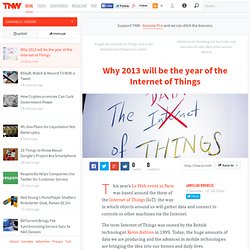
The term Internet of Things was coined by the British technologist Kevin Ashton in 1999. Today, the huge amounts of data we are producing and the advances in mobile technologies are bringing the idea into our homes and daily lives. There are still issues that need to be bashed out of course, proprietary technologies and closed data systems don’t do much to help things along. Privacy, security and networks are also in need of further consideration. However, products like the Fitbit or Fuelband are already becoming commonplace and makers are experimenting with remote systems like Lockitron for front doors and Growerbot for watering house plants. New Linux worm targets routers, cameras, “Internet of things” devices.
Researchers have discovered a Linux worm capable of infecting a wide range of home routers, set-top boxes, security cameras, and other consumer devices that are increasingly equipped with an Internet connection.
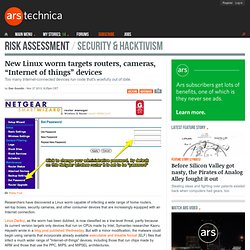
Linux.Darlloz, as the worm has been dubbed, is now classified as a low-level threat, partly because its current version targets only devices that run on CPUs made by Intel, Symantec researcher Kaoru Hayashi wrote in a blog post published Wednesday. But with a minor modification, the malware could begin using variants that incorporate already available executable and linkable format (ELF) files that infect a much wider range of "Internet-of-things" devices, including those that run chips made by ARM and those that use the PPC, MIPS, and MIPSEL architectures. "Upon execution, the worm generates IP addresses randomly, accesses a specific path on the machine with well-known ID and passwords, and sends HTTP POST requests, which exploit the vulnerability," Hayashi explained.